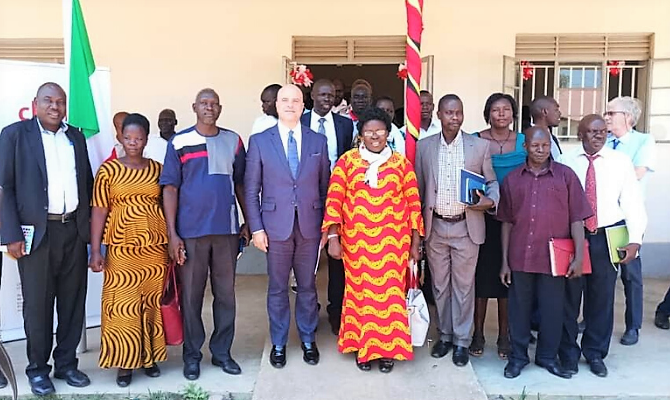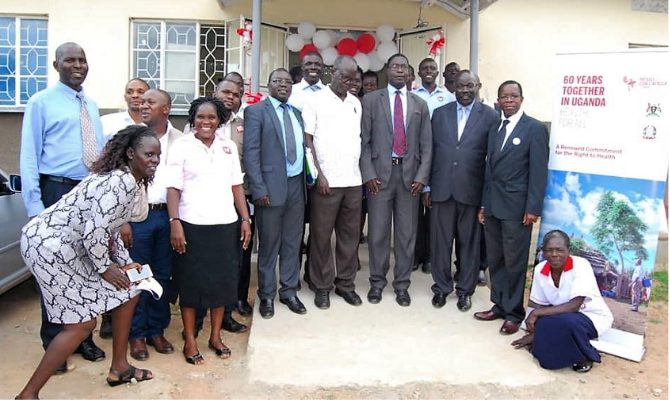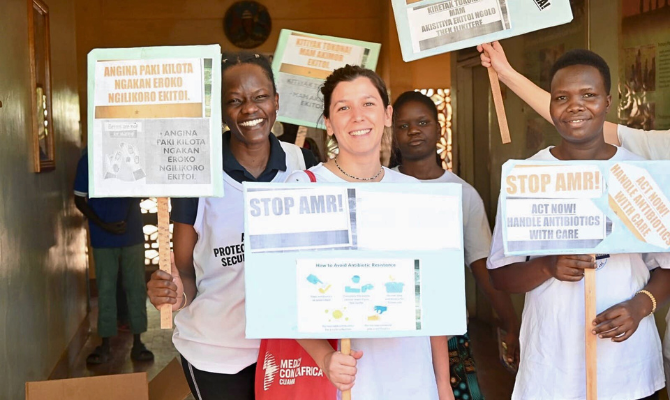The Story
Born in 1985, Jerry first went to school in the West Nile region, where he was born, and then moved about 400 km from home to attend a good college, the Teso College in Aloet, which gave him the right preparation for a scholarship to Mbarara University. Today he returns to his homeland in northern Uganda to visit his family and to follow Cuamm’s project activities.
5 years of medicine, an internship at the referral hospital in the Gulu district and a lot of clinical work between hospital and field. «For more than a year, I spent hours, entire days, in the operating room – Jerry narrates – I would go in at dawn and come out after the sun went down, days could go by without me seeing the light of noon!». Then, the experience at Nyapea Hospital first as a doctor and, in 2012, as Medical Director. A turning point in the professional life of Jerry, who was only 27 years old when he received the appointment from Bishop Lino Wanok, «one of the three most significant people in my professional life – says Jerry – I would have met others after him but I know that it all started there, in Nyapea».
«Suddenly I was in a different role, one of responsibility, sure, but also a very stimulating one. It was a constant questioning and figuring out how best to manage staff, how to ensure the quality of services and how to optimise resources. I had gone from worrying about the patient and his health to having two new priorities: finding resources for the hospital and ensuring its proper management”.
To fulfil his role to the best of his abilities, Jerry attended a planning and management course in an Ugandan institute. An experience that opened his eyes not only to the functioning of a healthcare facility, but also to the value and importance of healthcare as a public thing.
The Encounter with Cuamm
During his years as Health Director, Jerry came into contact with Peter Lochoro – Country Representative of Cuamm, which was just starting to support the Nyapea hospital. From there, they began collaborating on various researches, the very first one on tuberculosis (Tb) in Karamoja. Jarry later became technical manager, while at the same time receiving a scholarship to attend a Master’s in Epidemiology at Makerere University to study in depth aspects of medicine that he had not had the opportunity to study before and which – as Jerry says – «allowed me to do my job better». A job that Jerry and Peter, now his colleague and mentor, call “Adapting Programming” and which they explain as «reprogramming by adapting and that’s exactly what we do: we evaluate, we analyse, and we continually question the operation. It doesn’t mean fumbling around, on the contrary, it means recognising changes and being able to rethink and redesign what you are doing with a constant eye on the expected outcome and impact. We certainly can’t say it’s boring, in fact sometimes I wish it was, at least a little bit», concludes Jerry with irony.
Future aspirations
When congratulated on the commitment and dedication he has shown so far towards his work, Jerry replies by focusing on the future: «I am happy with what I have been able to do, but I do not want to stop here. My next goal? A PhD in tropical diseases, to acquire excellent skills and then to be able to combine my work with academic, teaching activities. Passing on knowledge and strengthening skills is crucial: only by relying on qualified and dedicated professionals can we respond to everyday needs, be ready for future challenges and have a decisive impact on our country’s health indicators».
So what are the future challenges? «To give an example, I can talk about the West Nile, my region. I left ten years ago and that place has changed: it did not used to be a malaria area, there was a dense forest and the climate was quite cold. In recent years, the forest area has been reduced, the temperatures have risen and the anopheles mosquitoes have arrived. Today, therefore, malaria prevention is also important here. From a health point of view, the indicators are growing positively, but the refugee crisis caused by the civil war in neighbouring Sudan has had a big impact on the health system».
“I was born and raised in Uganda, this is where I gained experience and this is where I wanted to spend my skills. This continues to be my wish”.





